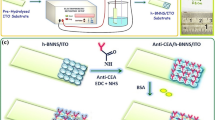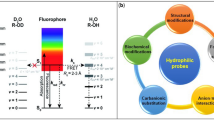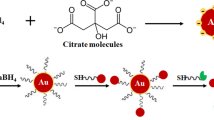Abstract
Based on upconversion nanoparticles (UCNPs) as energy donor and herring sperm DNA (hsDNA) as molecular recognition element, an unlabelled upconversion luminescence (UCL) affinity biosensor was constructed for the detection of anthraquinone (AQ) anticancer drugs in biological fluids. AQ anticancer drugs can insert into the double helix structure of hsDNA on the surface of UCNPs, thereby shortening the distance from UCNPs. Therefore, the luminescence resonance energy transfer (LRET) phenomenon is effectively triggered between UCNPs and AQ anticancer drugs. Hence, AQ anticancer drugs can be quantitatively detected according to the UCL quenching rate. The biosensor showed good sensitivity and stability for the detection of daunorubicin (DNR) and doxorubicin (ADM). For the detection of DNR, the linear range is 1–100 μg·mL−1 with a limit of detection (LOD) of 0.60 μg·mL−1, and for ADM, the linear range is 0.5–100 μg·mL−1 with a LOD of 0.38 μg·mL−1. The proposed biosensor provides a convenient method for monitoring AQ anticancer drugs in clinical biological fluids in the future.
Graphical abstract







Similar content being viewed by others
References
Ferlay J, Shin HR, Bray F, Forman D, Mathers C, Parkin DM (2010) Estimates of worldwide burden of cancer in 2008: GLOBOCAN 2008. Int J Cancer 127(12):2893–2917. https://doi.org/10.1002/ijc.25516
Jafari M, Rezvanpour A (2019) Upconversion nano-particles from synthesis to cancer treatment: a review. Adv Powder Technol 30(9):1731–1753. https://doi.org/10.1016/j.apt.2019.05.027
Qiu L, Zhou G, Cao S (2020) Targeted inhibition of ULK1 enhances daunorubicin sensitivity in acute myeloid leukemia. Life Sci 243:117234. https://doi.org/10.1016/j.lfs.2019.117234
Schramm F, Zimmermann M, Jorch N, Pekrun A, Borkhardt A, Imschweiler T, Christiansen H, Faber J, Feuchtinger T, Schmid I, Beron G, Horstmann MA, Escherich G (2019) Daunorubicin during delayed intensification decreases the incidence of infectious complications-a randomized comparison in trial CoALL 08-09. Leuk Lymphoma 60(1):60–68. https://doi.org/10.1080/10428194.2018.1473575
Jirkovský E, Jirkovská A, Bavlovič-Piskáčková H, Skalická V, Pokorná Z, Karabanovich G, Kollárová-Brázdová P, Kubeš J, Lenčová-Popelová O, Mazurová Y, Adamcová M, Lyon AR, Roh J, Šimůnek T, Štěrbová-Kovaříková P, Štěrba M (2021) Clinically translatable prevention of anthracycline cardiotoxicity by dexrazoxane is mediated by topoisomerase II beta and not metal chelation. Circ Heart Fail 14(11):e008209. https://doi.org/10.1161/CIRCHEARTFAILURE.120.008209
Haghi-Aminjan H, Farhood B, Rahimifard M, Didari T, Baeeri M, Hassani S, Hosseini R, Abdollahi M (2018) The protective role of melatonin in chemotherapy-induced nephrotoxicity: a systematic review of non-clinical studies. Expert Opin Drug Metab Toxicol 14(9):937–950. https://doi.org/10.1080/17425255.2018.1513492
Zhou H, Fu LX, Li L, Chen YY, Zhu HQ, Zhou JL, Lv MX, Gan RZ, Zhang XX, Liang G (2020) The epigallocatechin gallate derivative Y6 reduces the cardiotoxicity and enhances the efficacy of daunorubicin against human hepatocellular carcinoma by inhibiting carbonyl reductase 1 expression. J Ethnopharmacol 261:113118. https://doi.org/10.1016/j.jep.2020.113118
Sahyon HA, Al-Harbi SA (2020) Chemoprotective role of an extract of the heart of the Phoenix dactylifera tree on adriamycin-induced cardiotoxicity and nephcity by regulating apoptosis, oxidative stress and PD-1 suppression. Food Chem Toxicol 135:111045. https://doi.org/10.1016/j.fct.2019.111045
Karimi-Maleh H, Alizadeh M, Orooji Y, Karimi F, Baghayeri M, Rouhi J, Tajik S, Beitollahi H, Agarwal S, Gupta VK, Rajendran S, Rostamnia S, Fu L, Saberi-Movahed F, Malekmohammadi S (2021) Guanine-based DNA biosensor amplified with Pt/SWCNTs nanocomposite as analytical tool for nanomolar determination of daunorubicin as an anticancer drug: a docking/experimental investigation. Ind Eng Chem Res 60(2):816–823. https://doi.org/10.1021/acs.iecr.0c04698
Oliveira-Brett AM, Paquim AMC, Diculescu VC, Piedade JAP (2006) Electrochemistry of nanoscale DNA surface films on carbon. Med Eng Phys 28(10):963–970. https://doi.org/10.1016/j.medengphy.2006.05.009
Yu DS, Ma CP, Chang SY (2000) Establishment and characterization of renal cell carcinoma cell lines with multidrug resistance. Urol Res 28(2):86–92. https://doi.org/10.1007/s002400050143
Guichard N, Ogereau M, Falaschi L, Rudaz S, Schappler J, Bonnabry P, Fleury-Souverain S (2018) Determination of 16 antineoplastic drugs by capillary electrophoresis with UV detection: applications in quality control. Electrophoresis 39(20):2512–2520. https://doi.org/10.1002/elps.201800007
Katzenmeyer JB, Eddy CV, Arriaga EA (2010) Tandem laser-induced fluorescence and mass spectrometry detection for high-performance liquid chromatography analysis of the in vitro metabolism of doxorubicin. Anal Chem 82(19):8113–8120. https://doi.org/10.1021/ac1011415
Bezeaud A, Drouet L, Leverger G, Griffin JH, Guillin MC (1986) Effect of L-asparaginase therapy for acute lymphoblastic leukemia on plasma vitamin K-dependent coagulation factors and inhibitors. J Pediatr 108:698–701. https://doi.org/10.1016/s0022-3476(86)81044-7
Deák É, Rosta J, Boros K, Kis G, Sántha P, Messlinger K, Jancsó G, Dux M (2018) Chronic adriamycin treatment impairs CGRP-mediated functions of meningeal sensory nerves. Neuropeptides 69:46–52. https://doi.org/10.1016/j.npep.2018.04.003
Wang Y, Zong S, Wu L, Zhang Y, Wang Z, Wang Z, Chen B, Cui Y (2018) Evaluation of multidrug resistance of leukemia using surface-enhanced Raman scattering method for clinical applications. ACS Appl Mater Interfaces 10(30):24999–25005. https://doi.org/10.1021/acsami.8b02917
Szafraniec E, Majzner K, Farhane Z, Byrne HJ, Lukawska M, Oszczapowicz I, Chlopicki S, Baranska M (2016) Spectroscopic studies of anthracyclines: structural characterization and in vitro tracking. Spectrochim Acta A Mol Biomol Spectrosc 169:152–160. https://doi.org/10.1016/j.saa.2016.06.035
Chen Z, Qian S, Liu G, Chen X, Chen J (2011) Highly sensitive determination of doxorubicin and daunorubicin based on their effect on the resonance light scattering signals of the ethidium-DNA complex. Microchim Acta 175:217–223. https://doi.org/10.1007/s00604-011-0692-2
Pakmanesh F, Moslemi D, Mahjoub S (2020) Pre and post chemotherapy evaluation of breast cancer patients: biochemical approach of serum selenium and antioxidant enzymes. Caspian. J Intern Med 11(4):403–409. https://doi.org/10.22088/cjim.11.4.403
Alves AC, Ribeiro D, Horta M, Lima JLFC, Nunes C, Reis S (2017) The daunorubicin interplay with mimetic model membranes of cancer cells: a biophysical interpretation. BBA-Biomembranes 1859(5):941–948. https://doi.org/10.1016/j.bbamem.2017.01.034
Zhao XY, Wang J, Hao HG, Yang H, Yang QS, Zhao WY (2021) A water-stable europium-MOF sensor for the selective, sensitive ratiometric fluorescence detection of anthrax biomarker. Microchem J 166:106253. https://doi.org/10.1016/j.microc.2021.106253
Ren W, Pang J, Ma R, Liang X, Wei M, Suo Z, He B, Liu Y (2022) A signal on-off fluorescence sensor based on the self-assembly DNA tetrahedron for simultaneous detection of ochratoxin A and aflatoxin B1. Anal Chim Acta 1198:339566. https://doi.org/10.1016/j.aca.2022.339566
Jia P, Yang K, Hou J, Cao Y, Wang X, Wang L (2021) Ingenious dual-emitting Ru@UiO-66-NH2 composite as ratiometric fluorescence sensor for detection of mercury in aqueous. J Hazard Mater 408:124469. https://doi.org/10.1016/j.jhazmat.2020.124469
Lin Z, Ma Q, Fei X, Zhang H, Su X (2014) A novel aptamer functionalized CuInS2 quantum dots probe for daunorubicin sensing and near infrared imaging of prostate cancer cells. Anal Chim Acta 818:54–60. https://doi.org/10.1016/j.aca.2014.01.057
Guo D, Xu P, Chen D, Wang L, Zhu Y, Zuo Y, Chen B (2020) Daunorubicin-loaded CdTe QDs conjugated with Anti-CD123 mAbs: a novel delivery system for myelodysplastic syndromes treatment. Int J Nanomedicine 15:521–536. https://doi.org/10.2147/IJN.S233395
Manzoori JL, Jouyban A, Amjadi M, Panahi-Azar V, Karami-Bonari AR, Tamizi E (2011) Spectrofluorimetric determination of buparvaquone in biological fluids, food samples and a pharmaceutical formulation by using terbium-deferasirox probe. Food Chem 126(4):1845–1849. https://doi.org/10.1016/j.foodchem.2010.11.160
Zhu J, Shen J, Hu B, Yang L, Jiang C (2022) Chromaticity evolutionary detection of food contaminant semicarbazide through an upconversion luminescence-based nanosensor. Anal Chem 94(2):1126–1134. https://doi.org/10.1021/acs.analchem.1c04207
Sun G, Xie Y, Sun L, Zhang H (2021) Lanthanide upconversion and downshifting luminescence for biomolecules detection. Nanoscale Horiz 6(10):766–780. https://doi.org/10.1039/d1nh00299f
Li Y, Li Y, Zhang D, Tan W, Shi J, Li Z, Liu H, Yu Y, Yang L, Wang X, Gong Y, Zou X (2021) A fluorescence resonance energy transfer probe based on functionalized graphene oxide and upconversion nanoparticles for sensitive and rapid detection of zearalenone. LWT 147:111541. https://doi.org/10.1016/j.lwt.2021.111541
Jo EJ, Byun JY, Mun H, Bang D, Son JH, Lee JY, Lee LP, Kim MG (2018) Single-step LRET aptasensor for rapid mycotoxin detection. Anal Chem 90(1):716–722. https://doi.org/10.1021/acs.analchem.7b02368
Bogdan N, Vetrone F, Ozin GA, Capobianco JA (2011) Synthesis of ligand-free colloidally stable water dispersible brightly luminescent lanthanide-doped upconverting nanoparticles. Nano Lett 11(2):835–840. https://doi.org/10.1021/nl1041929
Li P, Liu S, Yan S, Fan X, He Y (2011) A sensitive sensor for anthraquinone anticancer drugs and hsDNA based on CdTe/CdS quantum dots fluorescence reversible control. Colloids Surf A: Physicochem Eng Asp 392(1):7–15. https://doi.org/10.1016/j.colsurfa.2011.08.037
Zhu H, Ding Y, Wang A, Sun X, Wu XC, Zhu JJ (2015) A simple strategy based on upconversion nanoparticles for a fluorescent resonant energy transfer biosensor. J Mater Chem B 3(3):458–464. https://doi.org/10.1039/c4tb01320d
Boyer JC, Vetrone F, Cuccia LA, Capobianco JA (2006) Synthesis of colloidal upconverting NaYF4 nanocrystals doped with Er3+, Yb3+ and Tm3+, Yb3+ via thermal decomposition of lanthanide trifluoroacetate precursors. J Am Chem Soc 128(23):7444–7445. https://doi.org/10.1021/ja061848b
Krzak A, Swiech O, Majdecki M, Bilewicz R (2017) Complexing daunorubicin with β-cyclodextrin derivative increases drug intercalation into DNA. Electrochim Acta 247:139–148. https://doi.org/10.1016/j.electacta.2017.06.140
Takenaka S, Ihara T, Takagi M (1990) Bis-9-acridinyl derivative containing a viologen linker chain: electrochemically active intercalator for reversible labelling of DNA. J Chem Soc Chem Commun 21:1485–1487. https://doi.org/10.1039/c39900001485
Quigley GJ, Wang AH, Ughetto G, van der Marel G, van Boom JH, Rich A (1980) Molecular structure of an anticancer drug-DNA complex: daunomycin plus d(CpGpTpApCpG). Proc Natl Acad Sci USA 77(12):7204–7208. https://doi.org/10.1073/pnas.77.12.7204
Harahap Y, Ardiningsih P, Corintias Winarti A, Purwanto DJ (2020) Analysis of the doxorubicin and doxorubicinol in the plasma of breast cancer patients for monitoring the toxicity of doxorubicin. Drug Des Devel Ther 14:3469–3475. https://doi.org/10.2147/DDDT.S251144
Zhang L, Xing H, Liu W, Wang Z, Hao Y, Wang H, Dong W, Liu Y, Shuang S, Dong C, Gong X (2021) 11-Mercaptoundecanoic acid-functionalized carbon dots as a ratiometric optical probe for doxorubicin detection. ACS Appl Nano Mater 4:13734–13746. https://doi.org/10.1021/acsanm.1c03141
Mo J, Wang S, Zeng J, Ding X (2023) Aptamer-based upconversion fluorescence sensor for doxorubicin detection. J Fluoresc 33(5):1897–1905. https://doi.org/10.1007/s10895-023-03184-5
Mescheryakova SA, Matlakhov IS, Strokin PD, Drozd DD, Goryacheva IY, Goryacheva OA (2023) Fluorescent alloyed CdZnSeS/ZnS nanosensor for doxorubicin detection. Biosensors 13(6):596. https://doi.org/10.3390/bios13060596
Rus I, Tertiș M, Barbălată C, Porfire A, Tomuță I, Săndulescu R, Cristea C (2021) An electrochemical strategy for the simultaneous detection of doxorubicin and simvastatin for their potential use in the treatment of cancer. Biosensors 11(1):15. https://doi.org/10.3390/bios11010015
Zeng J, Wang X, Jia Y, Mo J, Sun R, Wu T, Xu Q, Jin H (2021) A fluorescent sensor for daunorubicin determination using 808 nm-excited upconversion nanoparticles. J Inorg Organomet Polym Mater 31:2868–2876. https://doi.org/10.1007/s10904-020-01872-4
Findik M, Bingol H, Erdem A (2021) Electrochemical detection of interaction between daunorubicin and DNA by hybrid nanoflowers modified graphite electrodes. Sens Actuators B Chem 329:129120. https://doi.org/10.1016/j.snb.2020.129120
Congur G, Eksin E, Erdem A (2021) Levan modified DNA biosensor for voltammetric detection of daunorubicin-DNA interaction. Sens Actuators B Chem 326:128818. https://doi.org/10.1016/j.snb.2020.128818
Funding
This research was supported in part by the Natural Science Foundation of Fujian Province (Nos. 2020J01628, 2022J011310), the Fuzhou Health Innovation Platform Construction Project (No. 2021-S-wp2), and the Fuzhou Science and Technology Plan Technology Innovation Platform Project (No. 2022-P-018).
Author information
Authors and Affiliations
Corresponding authors
Ethics declarations
Competing interests
The authors declare no competing interests.
Additional information
Publisher’s Note
Springer Nature remains neutral with regard to jurisdictional claims in published maps and institutional affiliations.
Supplementary information
ESM 1
(DOCX 416 kb)
About this article
Cite this article
He, W., Chen, Z., Yu, C. et al. Unlabelled LRET biosensor based on double-stranded DNA for the detection of anthraquinone anticancer drugs. Microchim Acta 191, 15 (2024). https://doi.org/10.1007/s00604-023-06076-4
Received:
Accepted:
Published:
DOI: https://doi.org/10.1007/s00604-023-06076-4




